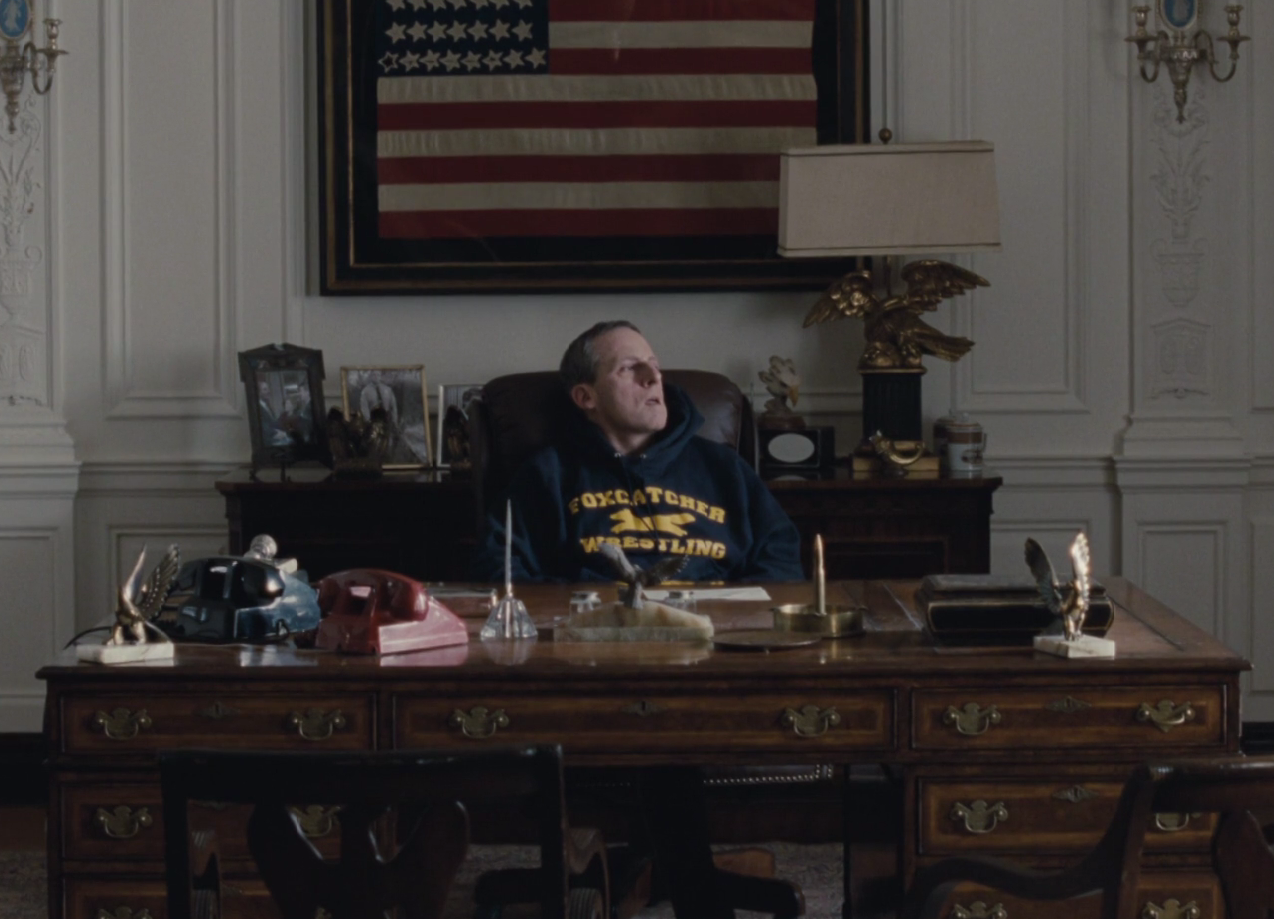As several media commentators observed
earlier this year, the blockbuster season, not too long ago confined to summer
and Christmas time, has begun to swell like No-Face from Spirited Away, consuming May and April and threatening to spill
over into March, November and perhaps even beyond. It’s a disconcerting trend
for those of us who would like to go at least a couple months without having to
hear the word “superhero”. Arguably, however, the same thing has already
happened with Oscar season. Although the films themselves still usually come
out sometime between October and December, thanks to festivals and a
proliferating, rather dubious field of online pundits, you start seeing
predictions for next year’s Oscars
before this year’s ceremony even
airs. This is also not a particularly good thing.
Take Foxcatcher, Bennett Miller’s
based-on-real-life story about Olympic-wrestler brothers Mark and Dave Schultz
and their disturbingly wealthy benefactor, John du Pont. The movie debuted at
the Cannes Film Festival in May to mostly strong reviews, and ever since then,
it’s been a mainstay on award prognosticators’ lists. On one hand, taking the
festival circuit route allows Foxcatcher
to build up hype; voters tend to go for sure bets (i.e. what they already know
they’re supposed to like), so once something cements its status as an Oscar
contender, it generally remains there. But at the same time, being labeled
“Oscar-worthy” comes with certain expectations. Oscar-worthy movies have
prestigious actors whose roles demand some amount of yelling and/or crying.
They involve more dialogue than special effects but are large enough in scope
that they don’t feel “slight”. They say Important Things about Important Stuff,
like slavery or the film industry, striking a comfortable balance between serious
and cathartic. The earlier you put yourself out in the open, the more time
people have to realize that you fail to meet those expectations and the
likelier it is that the initial goodwill will fade and you’ll experience a
backlash.
It’s probably
unfair to review a movie by talking about its hype and awards potential, since
that says nothing about its actual quality, but I can’t deny that I went into Foxcatcher with a specific vision in my
head and left feeling somewhat let down, disoriented for reasons I couldn’t
quite pinpoint. The truth is, this is not an Oscar movie. Sure, it’s based on a
true story and has an Oscar-nominated director at the helm, two elements that
never hurt your chances. Yet despite having guided both of his previous efforts
to Best Picture nominations, Bennett Miller is hardly a household name; like
J.C. Chandor, another rising talent who thrives on quiet adult dramas, his
style is too understated to garner the kind of devotion inspired by David
Fincher and Paul Thomas Anderson. The cast is more well-liked than prestigious
(of the three main actors, only Mark Ruffalo has an Oscar nomination), and
although it contains not-particularly-subtle messages about the danger of
American exceptionalism, this isn’t exactly Selma
as far as Important Stuff goes.
So what
to make of it? Foxcatcher falls in
between a lot of things – not quite grand or timely enough to be Oscar-bait,
but not pulpy enough to be “fun”; not intimate enough to be a character study,
but not comic enough to be satire; not fussy enough to be a biopic, not rousing
enough to be a sports story and not taut enough to be a thriller. It’s bleak,
but in a way that feels almost mundane, like waiting for an explosion that
never happens. The camera stays still except for a smattering of brief tracking
shots and handheld close-ups, the latter mostly during wrestling scenes. Yet
even those have a vaguely clinical gloss to them, shot less like battles than
dances, graceful and precise. The first half-hour at least (sans opening credits)
is void of musical cues, focusing instead on sound – the squeak of shoes on
rubber floors, the soft slap of bodies colliding, the violent drone of helicopter
blades. There’s nothing elaborate or showy; things just happen.
Even
the acting is unexpectedly subtle, considering the roles and the awards
attention likely to be heaped on it (Oscar prefers loud, no-holds-barred
performances, as evidenced by Meryl Streep’s nomination for August: Osage County). Here, it’s all
body language, silences and meaningful blinking, and what little emotion does
manage to seep through is directed internally; the only thing resembling an
honest, non-passive-aggressive confrontation occurs behind closed doors, voices
muffled. Steve Carell’s role is especially ripe for scenery-chewing, and I
doubt anyone would’ve faulted the actor if he went that direction. On the
contrary, though, beyond the prosthetic nose and breathy, staccato speech, he’s
rather subdued and enigmatic. As off-putting as he frequently is, du Pont never
comes across as anything other than wretchedly, painfully human, a lonely,
eccentric multimillionaire with deep-seated emotional and psychological issues
and too much time on his hands. You would be tempted to feel sorry for him if
you weren’t constantly worried about what he was going to do next. Mark
Schultz, played by heartthrob-turned-respectable-actor Channing Tatum with
glowering, pent-up self-loathing, is equally, if not more, menacing. I was
somewhat surprised to see the credits list the real-life Mark as an associate
producer, since the movie doesn’t portray him in the most flattering light, but
regardless, it’s hard not to admire Tatum’s intensity, expertly pitched between
rigid and visceral. The more I think about it, the less I can imagine anyone else
in the part. As the ill-fated Dave Schultz (by far the least weird character in
the movie), Mark Ruffalo is likely to get overshadowed by his costars come
awards time, but that should not diminish his nuanced performance, which turns
tiny, seemingly insignificant gestures into gut-punches.
Links:


No comments:
Post a Comment